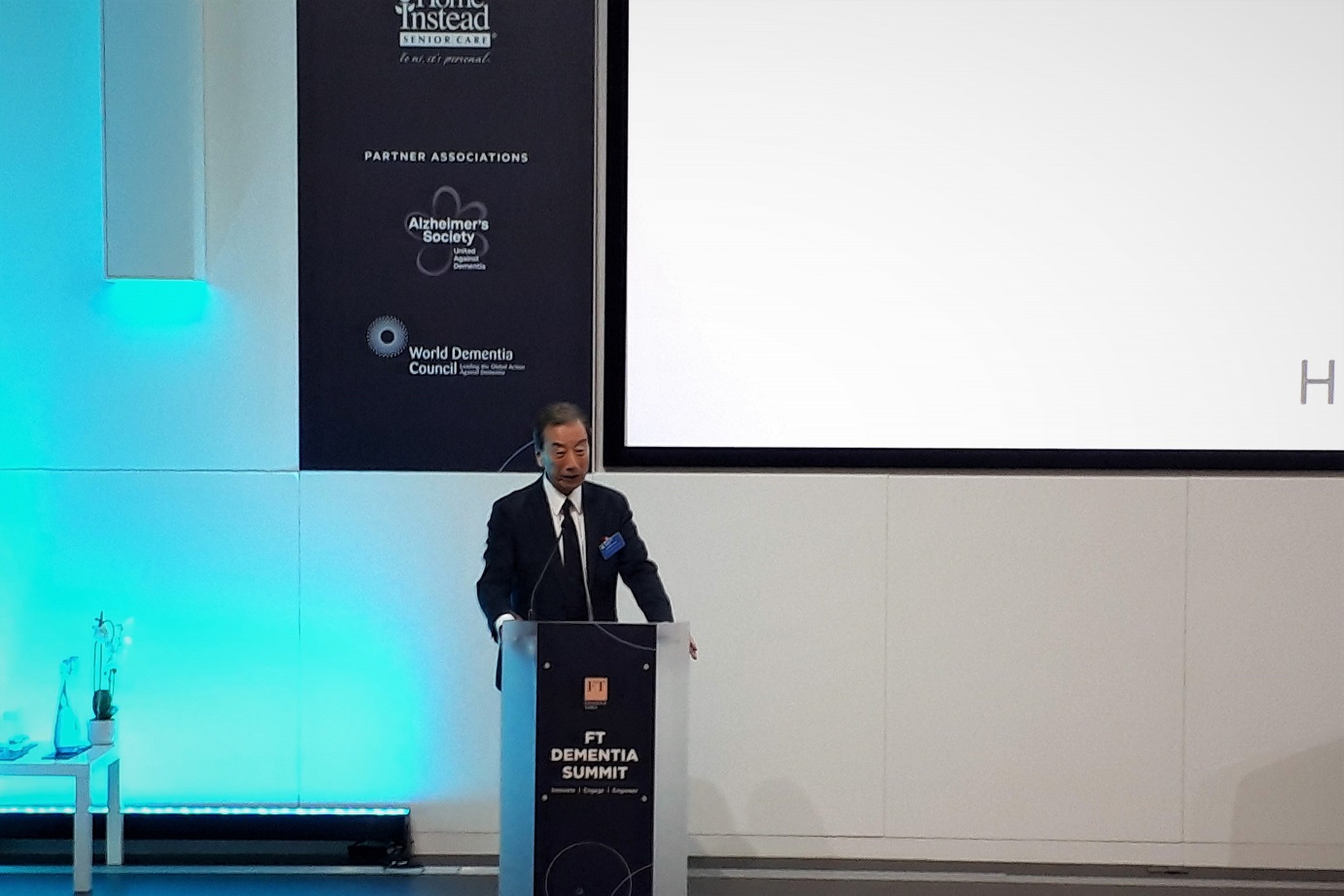[Lecture Report] Tackling Dementia through Global Cross-Sector Collaboration (FT Dementia Summit, September 18, 2019, London, England)
date : 10/8/2019
Tags: Dementia
![[Lecture Report] Tackling Dementia through Global Cross-Sector Collaboration (FT Dementia Summit, September 18, 2019, London, England)](https://hgpi.org/en/wp-content/uploads/sites/2/lecture-media-79-top.jpg)
On September 18, 2019, HGPI Chairman Dr. Kiyoshi Kurokawa gave a lecture at the FT Dementia Summit in London, England entitled “Tackling Dementia through Global Cross-Sector Collaboration.”
This summit was hosted by the Financial Times, a major media outlet from the U.K. It was held to discuss issues concerning dementia facing society and strategies to solve those issues, as well as to share expertise on the latest advances in research and development and care. The sessions could generally be divided into three topics: the future role of industry in society’s response to dementia; the current status of and future outlook for research and development in dementia; and the ideal structure of dementia care. Lectures were mainly given by representatives from industry, NGOs, and academic organizations involved in dementia research and development or support.
On the topic of industry engagement with dementia, measures to implement dementia-friendly services or efforts to support dementia in civil society were introduced. It was pointed out that awareness towards dementia is increasing even among employees at businesses outside of the healthcare sector as more people experience dementia through family members and other people. Efforts from insurance companies or railway bureaus were introduced as part of that discussion. Similarly, the fact was mentioned that as businesses are seeing more people with dementia among their customers, it will become important for businesses to pursue profits by providing services to people with dementia. These talks deepened the discussion on the growing reciprocal relationship between the business sector and efforts to improve the everyday lives of people with dementia.
Topics discussed in dementia research and development included the current status of dementia research, efforts to create funds for supporting research and development for dementia, and methods for businesses to deepen cooperative relationships in research and development. The importance of collaboration between industry, government, and academia was emphasized when it was pointed out that such collaboration will make it easier to build information sharing platforms to overcome difficulties that research organizations face when attempting to share research data.
Stories detailing first-hand experiences from caregiving family members of people with dementia were presented during the session on dementia care. Other topics discussed were how to increase dementia care quality in the future and how the ideal structure of care will change. On the topic of improving care quality, examples of Dementia Carers Count activities were used to illustrate how higher satisfaction levels for caregivers leads to better mental states and higher satisfaction levels for the people receiving care. Activities introduced included workshops for improving the satisfaction levels of caregivers and training activities for relieving their psychological burdens. Additionally, on the topic of maintaining the quality of care or providing equal access to it, the importance of collaboration between industry, government, and academia was highlighted. Other emphasized topics included the importance of participation from private enterprises that support the care field and the importance of collaboration between industry, government, and academia to involve the people most affected from the planning phases of research.
Dr. Kurokawa’s lecture began with a look at the history of humanity’s experience on the path of overcoming infectious diseases. He then spoke of how society is currently facing a serious issue with dementia. He introduced HGPI’s history of promoting Public Private Partnerships (PPPs) with members of industry in the field of dementia, government, academia, and civil society. He spoke of how society’s perception of dementia has shifted since the establishment of the World Dementia Council (WDC) and how we must take every opportunity to continue shifting that perception. Speaking as a representative of Japan, which leads the world in population aging, he stressed the importance of proactive investments and collaborative efforts for dementia from multi-stakeholders.
Top Research & Recommendations Posts
- [Policy Recommendations] The Path to a Sustainable Healthcare System: Three Key Objectives for Public Deliberation (January 22, 2026)
- [Research Report] The 2025 Public Opinion Survey on Healthcare in Japan (March 17, 2025)
- [Research Report] Perceptions, Knowledge, Actions and Perspectives of Healthcare Organizations in Japan in Relation to Climate Change and Health: A Cross-Sectional Study (November 13, 2025)
- [Research Report] The 2023 Public Opinion Survey on Satisfaction in Healthcare in Japan and Healthcare Applications of Generative AI (January 11, 2024)
- [Policy Recommendations] Reshaping Japan’s Immunization Policy for Life Course Coverage and Vaccine Equity: Challenges and Prospects for an Era of Prevention and Health Promotion (April 25, 2025)
- [Policy Recommendations] Developing a National Health and Climate Strategy for Japan (June 26, 2024)
- [Policy Recommendations] Achieving Equity in Multidisciplinary Pain Treatment and Support Systems for Pain Management (March 31, 2023)
- [Research Report] Survey of Japanese Physicians Regarding Climate Change and Health (December 3, 2023)
- [Public Comment Submission] “Assessment Report on Climate Change Impacts in Japan (Draft Overview)” (December 24, 2025)
- [Research Report] The Public Opinion Survey on Child-Rearing in Modern Japan (Final Report) (March 4, 2022)
Featured Posts
-
2026-01-09
[Registration Open] (Hybrid Format) Dementia Project FY2025 Initiative Concluding Symposium “The Future of Dementia Policy Surrounding Families and Others Who Care for People with Dementia” (March 9, 2026)
![[Registration Open] (Hybrid Format) Dementia Project FY2025 Initiative Concluding Symposium “The Future of Dementia Policy Surrounding Families and Others Who Care for People with Dementia” (March 9, 2026)](https://hgpi.org/en/wp-content/uploads/sites/2/dementia-20260309-top.png)
-
2026-02-05
[Registration Open] (Webinar) The 141st HGPI Seminar “Current Status and Future Prospects of Korea’s Obesity Policy: Voices of People with Lived Experience in Policy Promotion” (March 3, 2026)
![[Registration Open] (Webinar) The 141st HGPI Seminar “Current Status and Future Prospects of Korea’s Obesity Policy: Voices of People with Lived Experience in Policy Promotion” (March 3, 2026)](https://hgpi.org/en/wp-content/uploads/sites/2/hs141-top-1.png)
-
2026-02-06
[Research Report] AMR Policy Update #5: Cancer Care and AMR (Part 2)
![[Research Report] AMR Policy Update #5: Cancer Care and AMR (Part 2)](https://hgpi.org/en/wp-content/uploads/sites/2/HGPI_20260204_AMR-Policy-Update-5.png)





